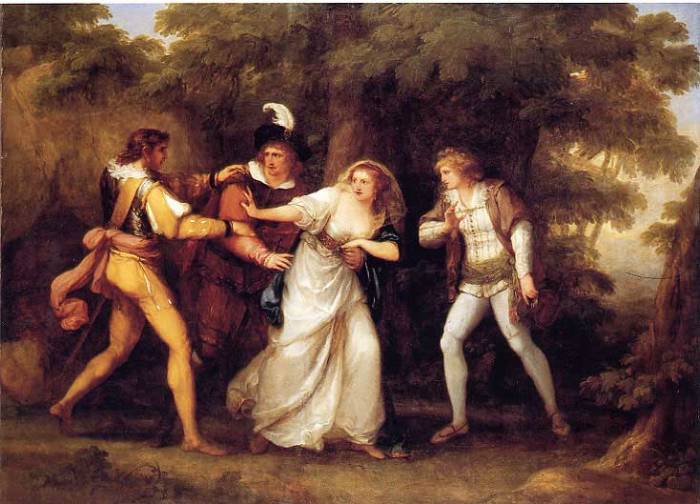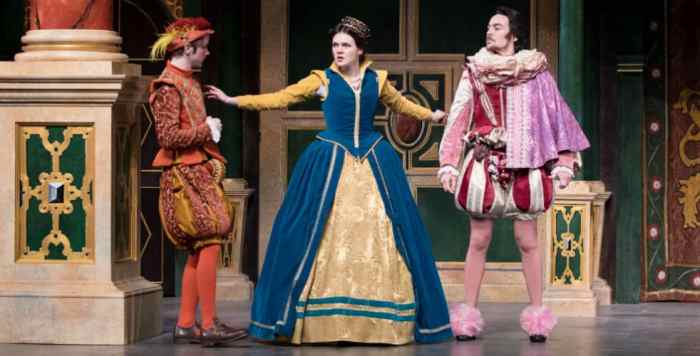Julia two gentlemen of verona – Julia in “The Two Gentlemen of Verona” is a captivating character who drives the play’s narrative with her unwavering love, resilience, and intelligence. Her experiences highlight the complexities of love, the dangers of deception, and the power of language.
Julia’s journey is a testament to the enduring power of love and the resilience of the human spirit. Despite facing obstacles and setbacks, she remains steadfast in her affections for Proteus, ultimately proving that true love can overcome even the most challenging circumstances.
Character Analysis: Julia

Julia is a central character in Shakespeare’s “Two Gentlemen of Verona.” She is a beautiful, witty, and independent young woman who becomes the object of affection for both Proteus and Valentine.
Julia’s personality is complex and multifaceted. She is intelligent, resourceful, and determined, but she is also capable of great passion and vulnerability. She is deeply in love with Proteus, but she is also willing to fight for her own happiness.
Julia’s motivations are driven by her love for Proteus and her desire for a life of her own choosing.
Role in the Play, Julia two gentlemen of verona
Julia plays a pivotal role in the plot of “Two Gentlemen of Verona.” She is the catalyst for the conflict between Proteus and Valentine, and she is ultimately responsible for their reconciliation. Julia’s journey is one of self-discovery and growth.
She learns to stand up for herself and to fight for what she believes in.
Relationship with Proteus
Julia’s relationship with Proteus is complex and tumultuous. Proteus initially loves Julia, but he is easily swayed by the charms of Silvia. Julia is heartbroken by Proteus’s betrayal, but she eventually forgives him and they are reunited at the end of the play.
- Julia’s love for Proteus is deep and unwavering. She is willing to do anything to be with him, even if it means putting herself in danger.
- Proteus’s love for Julia is more shallow and selfish. He is easily swayed by the charms of Silvia and is willing to abandon Julia without a second thought.
- Julia’s forgiveness of Proteus is a testament to her strength and compassion. She is able to see past his betrayal and recognize the good in him.
Theme of Love and Deception

The Two Gentlemen of Verona delves into the complexities of love, exploring its capacity for both joy and heartbreak. The play’s central theme of love is intertwined with deception, highlighting the dangers of betrayal and the impact of mistaken identity on relationships.
Love and its Complexities
Love is portrayed as a powerful force that can both elevate and destroy. The play depicts the transformative power of love, as seen in the transformation of Proteus from a loyal friend to a treacherous lover. Conversely, it also explores the destructive nature of love, as evidenced by Julia’s heartbreak and despair.
Julia in “The Two Gentlemen of Verona” exemplifies the importance of community involvement. Her selfless acts and unwavering support for her friends reflect the spirit of CIT in the Community Workbook , which emphasizes the transformative power of community engagement.
As Julia navigates the complexities of her relationships, she reminds us that true friendship and community spirit can overcome adversity and create a sense of belonging.
Deception’s Dangers
Deception plays a pivotal role in the play, highlighting its corrosive effects on relationships. Proteus’s betrayal of Valentine and his pursuit of Silvia through deception erode trust and undermine the bonds of friendship and love. Julia’s unwavering love for Proteus, despite his treachery, underscores the devastating consequences of deception.
Mistaken Identity and Relationships
Mistaken identity adds another layer of complexity to the play’s exploration of love and deception. The mistaken belief that Silvia loves Proteus leads to a series of misunderstandings and misinterpretations. This confusion amplifies the play’s themes of love, deception, and the fragility of relationships.
Language and Wordplay
Shakespeare’s “Two Gentlemen of Verona” is renowned for its intricate wordplay and skillful use of language. The playwright employs various literary devices to enhance the play’s humor, explore character perspectives, and shape the overall tone.
Puns
Shakespeare incorporates puns throughout the play, injecting humor and cleverness into the dialogue. For instance, in Act II, Scene IV, Speed remarks, “A man I am crossed with in pure love, and yet I in pure love am crossed too.”
This witty wordplay on “crossed” highlights the complexities of love and the playful nature of the characters.
Metaphors
Shakespeare’s use of metaphors enriches the play’s language and provides insights into the characters’ emotions and perspectives. In Act I, Scene I, Valentine describes his love for Silvia as “a fire that burns within my heart.” This metaphor conveys the intensity and passion of Valentine’s feelings, as well as the potentially destructive nature of love.
Rhetorical Devices
Shakespeare employs rhetorical devices such as antithesis, oxymoron, and paradox to create dramatic effect and explore contrasting ideas. In Act II, Scene IV, Julia laments, “I have no other but a woman’s reason; I think him so, because I think him so.”
This paradoxical statement reflects Julia’s confusion and the irrationality of love.
Language as Characterization
The language used by different characters reveals their personalities and motivations. Valentine and Proteus’s eloquent and poetic speech contrasts with the more straightforward and practical language of Speed and Launce. This distinction highlights the social hierarchy and the different perspectives of the characters.
Historical and Cultural Context
The Two Gentlemen of Verona was written and performed during the Elizabethan era, a period of significant social and cultural change in England. The play reflects the values and norms of this time, including the importance of social hierarchy, the role of women in society, and the influence of courtly love.
Elizabethan Era and Its Influence
The Elizabethan era was a time of great prosperity and cultural achievement. The reign of Queen Elizabeth I saw the flourishing of the arts, including literature, music, and theater. The theater was particularly popular during this time, and playwrights such as William Shakespeare wrote plays that reflected the values and interests of the Elizabethan audience.
Social Norms and Values
The Two Gentlemen of Verona reflects the social norms and values of the Elizabethan era. The play’s characters are members of the upper class, and their behavior is governed by the strict rules of etiquette and decorum. Women are expected to be chaste and obedient, and men are expected to be brave and honorable.
The play also reflects the importance of social hierarchy, with the characters’ actions and relationships determined by their social status.
Adaptations and Interpretations
Throughout history, The Two Gentlemen of Veronahas been adapted and interpreted in various forms, ranging from stage productions to film adaptations and even musical renditions. These adaptations have significantly influenced the play’s reception and understanding, offering fresh perspectives and interpretations.
Stage Productions
Stage productions have played a crucial role in shaping the play’s reception. Notable adaptations include:
- David Garrick’s 1762 adaptation, which modernized the language and removed some of the play’s bawdy elements.
- William Poel’s 1895 production, which emphasized the play’s pastoral setting and romantic elements.
- Peter Hall’s 1967 production, which explored the play’s homoerotic subtext.
Film Adaptations
Film adaptations have also contributed to the play’s popularity and interpretation:
- Two Gentlemen of Verona(1921), a silent film adaptation starring Rudolph Valentino.
- The Two Gentlemen of Verona(1968), a musical adaptation directed by Franco Zeffirelli.
- 10 Things I Hate About You(1999), a modern adaptation set in an American high school.
Musical Adaptations
Musical adaptations have provided a unique and engaging way to experience the play:
- The Two Gentlemen of Verona(1971), a Broadway musical adaptation with music by Galt MacDermot and lyrics by John Guare.
- Verona(2008), a Bollywood musical adaptation directed by Rajesh Gupta.
Strengths and Weaknesses
Different adaptations have their own strengths and weaknesses:
- Stage productions:Allow for a more immersive and immediate experience, but can be limited by the constraints of the stage.
- Film adaptations:Offer greater flexibility and visual impact, but may lose some of the play’s intimacy and theatricality.
- Musical adaptations:Combine the power of music with the narrative, but may alter the play’s original tone and themes.
Critical Reception and Analysis: Julia Two Gentlemen Of Verona

The Two Gentlemen of Veronahas garnered critical acclaim since its inception, captivating audiences with its charming characters, witty dialogue, and exploration of love and friendship. Over the centuries, the play has been subject to various critical interpretations, shedding light on its enduring legacy and impact on literary scholarship.
Early Critical Reception
During the Renaissance, The Two Gentlemen of Veronawas highly regarded as one of Shakespeare’s early masterpieces. Critics praised its lively and humorous tone, as well as its insightful depiction of young love and the complexities of friendship. However, some critics also noted its occasional lack of dramatic tension and the presence of improbable plot elements.
Later Critical Perspectives
In the 19th century, critics began to focus more on the play’s psychological depth and its exploration of themes such as identity, loyalty, and betrayal. Romantic critics lauded its idealized portrayal of love, while Victorian critics emphasized its moral lessons and its reflection of Elizabethan social norms.
Modern Interpretations
In the 20th and 21st centuries, The Two Gentlemen of Veronahas been re-evaluated through the lens of modern critical theories. Feminist critics have explored the play’s gender roles and the limitations faced by female characters. Postcolonial critics have examined its depiction of racial and cultural difference.
Queer critics have highlighted the play’s homoerotic subtext and its exploration of same-sex desire.
Enduring Legacy
The Two Gentlemen of Veronacontinues to be studied and performed today, demonstrating its enduring appeal and relevance. Its exploration of universal themes, its charming characters, and its witty dialogue have ensured its place in the canon of great literature. The play has also inspired numerous adaptations, including operas, ballets, and films, further solidifying its legacy as a timeless work of art.
FAQ Overview
Who is Julia in “The Two Gentlemen of Verona”?
Julia is a young woman who is deeply in love with Proteus. She is intelligent, resourceful, and determined to win his affection.
What is the main conflict in the play?
The main conflict in the play is the love triangle between Julia, Proteus, and Silvia. Proteus initially loves Julia but falls for Silvia, causing a rift between the two friends.
How does Julia’s character evolve throughout the play?
Julia’s character evolves from a naive and trusting young woman to a strong and independent woman who is willing to fight for what she believes in.